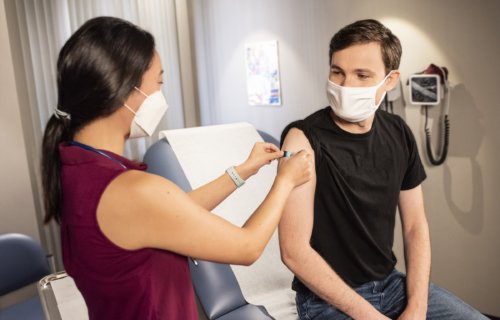ANN ARBOR, Mich. — How well a COVID-19 vaccine shot works varies from person to person. While getting a booster shot will likely give someone more protection than not, a new study finds your genes actually play a major role in whether you’re really safer after receiving a booster.
Researchers from the University of Michigan say their findings could lead to more personalized vaccinations in the future which boost the efficiency of antibodies.
“What’s most interesting with this work is the concept of personalized variability and understanding direct links between vaccine responses and different genes people have,” says Kelly Arnold, a U-M assistant professor of biomedical engineering, in a university release.
The new study identified an antibody-related gene which can predict whether booster shots that produce more antibodies will actually have success in raising a patient’s innate immune responses. Researchers also explored why many people respond differently to a conventional booster shot, which works by re-exposing the recipient’s immune system to the virus. Typically, this helps increase antibody concentration.
According to their findings, antibody concentration may not even matter because that person’s genes encode for immune receptors which do a poor job of sticking to the antibodies. Scientists call this problem having a lower affinity. As a result, the patient could have a respectable antibody count and still have a weak immune response after vaccination.
Tweaking vaccines to work with your genes
Although it’s just a theory today, the researchers say it may be possible to design a vaccine that also tweaks the structure of antibodies. This would make them more likely to stick to a patient’s immune receptors, overcoming the problem in their genes.
“Depending on your genetic background, we’ve found that vaccine boosting may be more or less effective in activating certain innate immune functions,” Arnold says. “And in some people, where boosting the concentrations of antibodies was ineffective, being able to change the affinity of antibodies could be the more successful route. Though this is still a theoretical concept and not yet possible in practice.”
An international team created a computer model to determine how various genetic factors influence a person’s immune response during vaccination. They used data and blood samples from a trial of a moderately successful HIV vaccine.
“In a mixed population of people, we’ve also shown how one specific genotype would drive whether that population was responsive to changes in antibody concentrations expected from traditional boosting,” Arnold reports.
Results of the computer model reveals that different variants of a gene that encodes the antibody IgG1 can predict how well vaccine boosters will increase antibody levels. For some people in the HIV vaccine trial, increasing antibody levels did not change the innate immune response in the body.
“What that tells us is that in populations with certain genetic variations, traditional boosting methods to increase antibody concentrations may not be as effective at improving innate immune functions,” Arnold concludes.
The study is published in the journal Frontiers in Immunology.
